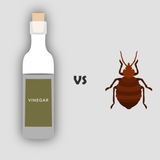 It is a given that bed bugs are among the most difficult pests to deal with. They live in just about any location as long as they are near their host. Among the most popular natural or organic home remedies is the use of vinegar. However, there is no evidence supporting the claim that it can kill bed bugs.
It is a given that bed bugs are among the most difficult pests to deal with. They live in just about any location as long as they are near their host. Among the most popular natural or organic home remedies is the use of vinegar. However, there is no evidence supporting the claim that it can kill bed bugs.
Does Vinegar Kill Bed Bugs And Their Eggs?
Vinegar contains acetic acid, which is believed to have an effect on bed bugs. It is made by fermenting alcohol continuously until the ethanol (alcoholic content) is used up. Similar to alcohol, vinegar can be made from different plants such as grapes, corn, apples, rice, and barley. Other varieties of vinegar can be made out of different ingredients.
Depending on the concentration of vinegar, spraying it directly on bed bugs and their eggs can kill them. The strong acetic acid will disrupt the insect’s nervous system. This increases the possibility of killing these insects, but it may not work alone to treat an infestation. You can use it for visible bed bugs but it will only work to repel them while you’re looking for a longer-lasting and more effective treatment.
How to Use Vinegar to Deal with Bed Bugs
There are a few simple things you can do to utilize homemade vinegar spray when dealing with bed bugs. Fill a spray bottle with white vinegar and use it to do the following:
- If you have already identified the infested areas, soak them with vinegar. See to it that you spray the vinegar over cracks and crevices on walls and narrow spaces where bugs hide. Doing this will make the bed bugs scatter and die on the soaked areas. The same goes for the seams of mattresses and box springs.
- Spray it over visible adult bed bugs or send them running to nearby areas that you have treated with vinegar.
- It can help prevent further infestation by soaking all infested areas. Do this for a few weeks until you notice a reduction in bed bug sightings.
Warning!!
It may be tempting to combine bleach and vinegar to kill bed bugs, but you should NEVER do this. It will cause the emission of chlorine gas, which is toxic and harmful to your health.
Pros and Cons of Using Vinegar to Getting Rid of Bed Bugs
|
Pros |
Cons |
|
It offers short-term effects as the acidic content can only work on disrupting the nervous system of bed bugs. |
The smell is terrible and can last quite long. |
|
Cheap and readily available. |
It may not kill bed bugs thoroughly, as it may only repel them. It may result in little to no effect on major infestations. |
|
This solution is very safe. You can actually spray it on any infested area as much as you like and never have to worry about your children or pets being harmed. |
The low pH level of vinegar may damage furniture. Though it is not harmful to pets like dogs and cats, it may have a toxic effect on reptilian pets. |
Bed bugs hate vinegar, but the worst it can do to them is repel them and force them to hide. When it comes to their eggs, vinegar may not work so much to kill them because of their exteriors. One way to get rid of them is to use a magnifying glass to find and treat them.
Since vinegar acts as a repellant, it won’t do anything huge when it comes to dealing with a bed bug infestation. It will only keep the bedbugs at bay, but it is enough to keep them hiding in your identified hiding areas while you search for a better and more effective bed bug treatment.
Other Options to Potentially Kill Bed Bugs
Aside from using vinegar, there are other options that you can use to get rid of these bugs. You can use high heat by getting bed bug heat equipment or using diatomaceous earth on cracks and crevices. Just like professionals, there are contact and residual chemical sprays that you can use at home. You can choose a product that kills bed bugs or you can also try other products like traps to control bugs and prevent their population from increasing. If you want to know more about these options, feel free to browse through our products at bedbugsos.ca.

